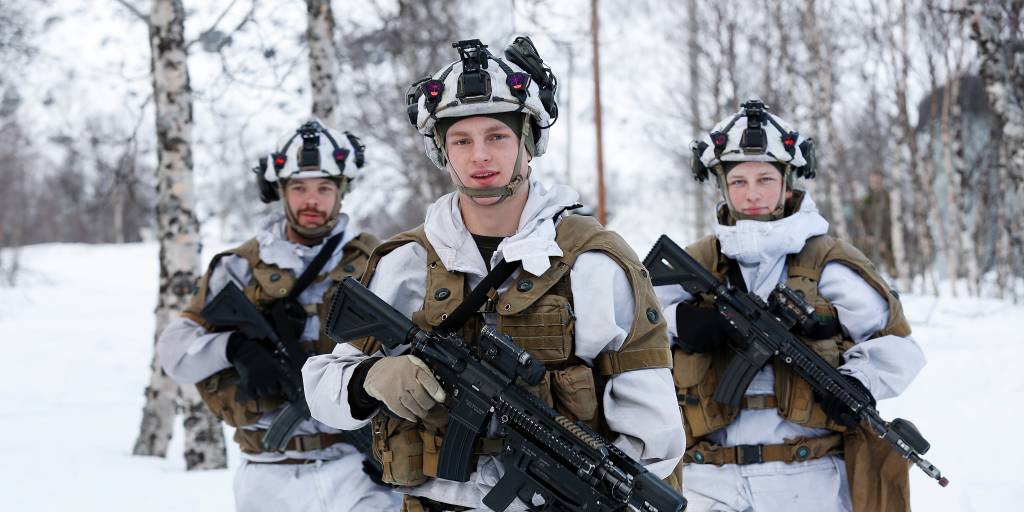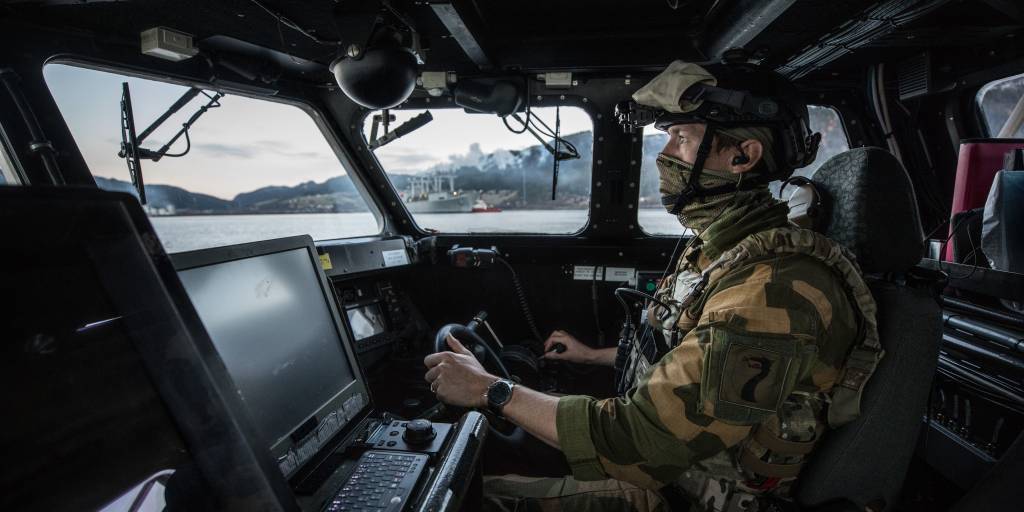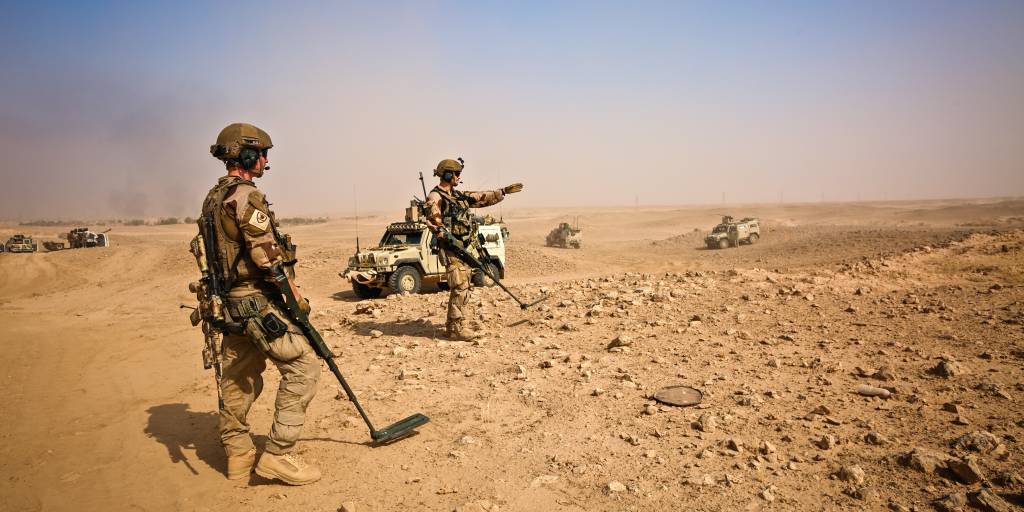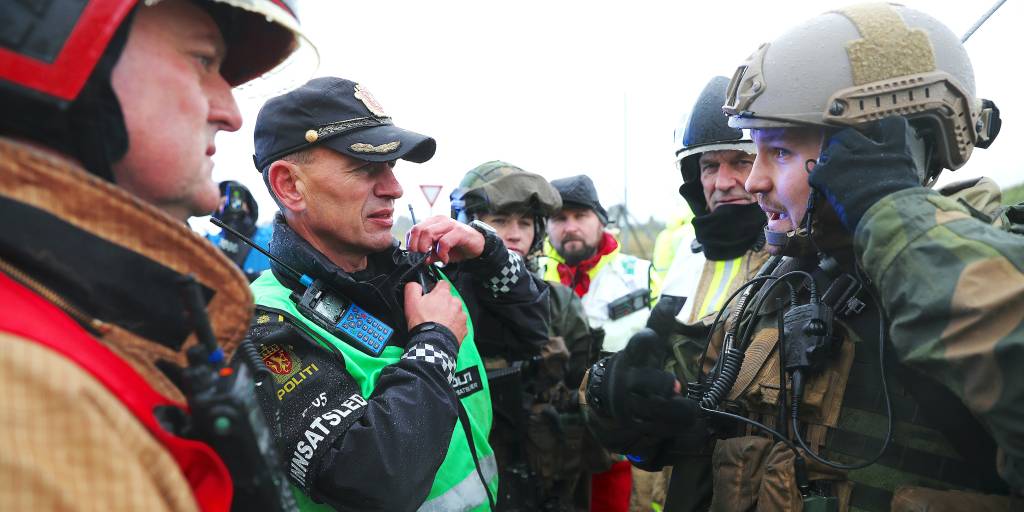
Our missions
On behalf of Norwegian society, the Norwegian Armed Forces solve a wide range of tasks to keep our country safe.
The Norwegian Armed Forces are Norway’s military power. Our main task is to protect our country from any threat or attack from abroad. The Norwegian Government and Parliament decides how Norway aligns itself within global security and defence policy.
The Government and Parliament also decide how Norway should use its armed forces. In addition to protecting the country, our politicians have asked the Norwegian Armed Forces to solve some additional tasks on behalf of civil society. We have summarised our task into five main missions.
This is what we do
-

Our main task is keeping Norway and our people safe. Our job is to ensure that no one dares to attack Norway, or puts any kind of pressure on Norwegian values, our democracy, or our politicians.
All of Norway, 24–7
We have a well-equipped army with skilled and experienced soldiers, and we have a nationwide and modernised home guard. The Royal Norwegian Navy has submarines and vessels that are constantly patrolling our waters. The Royal Norwegian Air Force guards the air over us, and our fighter jets are ready to scramble, whenever unknown aircraft approach Norwegian airspace.
We have world-class special forces, while our Cyber Defence secures the Armed Forces' digital infrastructure. The Norwegian Intelligence Service provides the Armed Forces and Norwegian authorities with a complete picture of what is happening around us. This enables the Norwegian Armed Forces to respond to any threat in a modern conflict.
In order to continue doing this, we must always renew and update ourselves. We must focus on top education, qualified people and state-of-the-art equipment. Throughout the 2020s, the Armed Forces will be strengthened with an entire fleet of F-35A fighter jets, P-8 Poseidon surveillance aircraft, new helicopters, tanks, artillery, air defence, and from 2030: new submarines. We have also made major changes in personnel structure and education. In addition, we cooperate closely with civil companies and the public sector.
Stronger together
It is overwhelming for a small country to solve all these tasks alone. That is why we are a member of NATO – the largest and strongest military alliance in the world. NATO guarantees our security, but at the same time Norway must stand up for the other members of the alliance. To ensure that allied forces operate seamlessly together, we must exercise and train regularly. Our allies must also know how to operate in Norwegian climate and conditions. This means that soldiers from NATO and other partners regularly come to Norway to train and participate in military exercises.
-

In critical situations, our politicians have to make difficult and important decisions. The Armed Forces provide our politicians with correct information and updated situational awareness, to help them make the best possible decisions.
We monitor Norwegian land territory, maritime areas, airspace and digital sphere. The radar chain in northern Norway monitors Norwegian airspace, and our fighter jets are ready to scramble at short notice.
Informing politicians
The Norwegian Intelligence Service collects and analyses information related to foreign states, organisations and people who may influence Norway and Norwegian interests. The Intelligence Service provides the Government with a vital foundation for making the right decisions in Norwegian foreign and security policy.
The Intelligence Service also supports military operations with situation analyses. This information ensures that Norwegian forces are capable of handling threats and challenges in the best possible way.
Sharing of information
The Intelligence Service is in charge for intelligence outside Norway, while the Norwegian Police Security Service (PST) is responsible for protecting citizens, interests and installations against threats within Norway. The two agencies cooperate and share information on terrorism and other threats towards Norway and our citizens.
-

The Armed Forces ensure that Norway maintains sovereignty over its territories – with military power if necessary. That is why we must be present in the air, on land and at sea. We do this every day, all year round. All of our activities are coordinated by the Norwegian Joint Headquarters (NJHQ).
Protecting the country
The Coast Guard and the Royal Norwegian Navy maintain Norwegian sovereignty at sea. With its frigates, submarines and corvettes, the Navy prevents unauthorised access to Norwegian territory. The Coast Guard patrols our coast and conducts fisheries control and other supervision missions.
We are part of NATO's air defence, and we contribute with air surveillance, and with our fighter jets. On land, the Border Guard continuously monitors Norway's 198 km (123 mi) long border to Russia. They are supported by the Garrison of Sør-Varanger, which guards the border 24–7.
International cooperation
Norway regularly participates in NATO's standing maritime forces. These maritime fleets control and maintain sovereignty over the Alliance's vast maritime area – including Norwegian waters.
-

Norway is part of the world. And we regulary experience that events abroad can have consequences here at home. By participating in military and peace-keeping operations abroad, we also contribute to peace and stability in Norway.
Worldwide contribution
We are members of NATO and the UN, and that commits Norway internationally. Since World War II, more than 100,000 Norwegian women and men have participated in more than a hundred international operations.
Norway's Government and Parliament decide when and how Norway will participate in international operations. Since 2010, Norwegian troops have participated in operations in Afghanistan, Mali, Lithuania, Iraq, and several other countries and regions.
Norway also regularly participates in NATO's standing maritime forces. These maritime fleets patrol and maintain sovereignty over the Alliance's vast maritime areas in Europe – including Norwegian waters.
-

The police ensure law and order in Norway. But when the police or other civil authorities need help, the Armed Forces can contribute with their personnel and equipment.
Examples of support to civil society are search operations for missing persons, removal of explosives, and counter-terrorism operations at sea, and at oil and gas installations. We do this in close cooperation with the police and other civil authorities.The Armed Forces also support the Joint Rescue Coordination Centres and the police in connection with search and rescue operations at sea and on land.
The Coast Guard is on duty 24–7 and assists in search and rescue operations at sea. It also has towing and oil spill response capacity, making the Coast Guard an important weapon in preventing disasters and minimising environmental damage.






